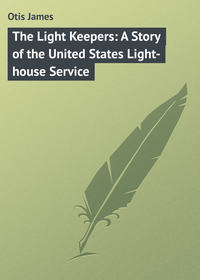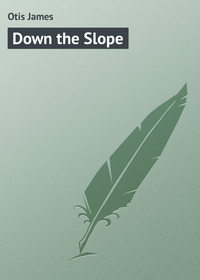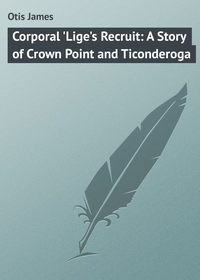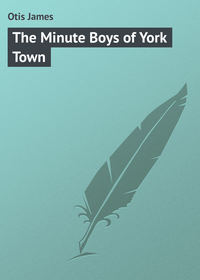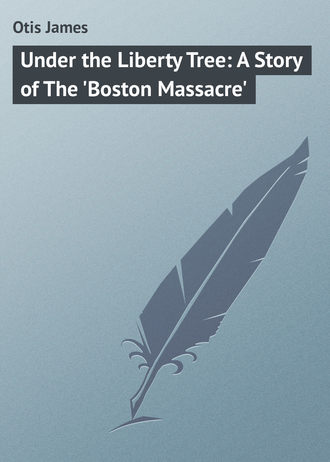 полная версия
полная версияUnder the Liberty Tree: A Story of The 'Boston Massacre'
"It is all very well for you to sneer when you don't understand the situation; but your harsh words won't alter the facts, and I tell you, Amos Richardson, you will see yet more blood spilled."
"And you propose to take a hand in the spilling, I suppose?"
"I shall be wherever anything of the kind is going on, of that you may rest assured. Do you know where your uncle is at this moment?"
"No."
"The people made prisoners of Wilmot and him, and carried them both to Faneuil Hall, where they have been examined and committed for trial. He will be hanged for murder."
"As he should be, even though he is my uncle! But when that has been done, what then?"
"You shall see," the barber's apprentice replied, in a prophetic tone. "I am not through with this matter yet."
Then Master Baker walked slowly away, as if the fate of the Colony of Massachusetts was in his keeping.
The interview with Master Piemont's assistant did not serve to cheer either Amos or Jim, but rather further distressed them in mind, and, after trying in vain each to give some comfort to the other, the two went to Chris Gore's home, where they learned that he was resting comfortably, in no danger of death.
On the following morning the tolling of the bell on New Brick Church told that little Chris Snyder was dead, and the city was in more of a ferment, if possible, than before.
Liberty Hall was crowded with people who had gathered to discuss the situation of affairs, which now seemed dangerous in the extreme, and threats against the "bloody backs" were openly indulged in.
Amos and Jim were together the greater portion of the time which intervened between Chris's death and his funeral; but saw nothing of the barber's apprentice.
They had been selected, together with four others of the dead boy's friends, to act as pall-bearers, and on Monday forenoon performed their part in the impressive ceremonies, which were held under the Liberty Tree, when beneath it was placed for a brief time the coffin bearing on its head the inscription, "Innocentia nusquam tuta;" on the foot, "Latat anguis in herba;" and on either side, "Hæret lateri lethalis arundo."
Four hundred schoolboys marched in couples behind the casket containing all that was mortal of Chris Snyder; thirteen hundred citizens followed, and the procession was closed by thirty chariots and chaises.
The bells of Boston and the neighbouring towns were tolled as the procession marched from Frog Lane to the Liberty Tree, and from thence to the burying-ground, and on every hand the little fellow was spoken of as the "first martyr in the cause of American liberty."
During the week which followed the funeral ceremonies, Amos and Jim were much together in the home of Chris Gore, whose wound was rapidly healing. They had little or no intercourse with the barber's apprentice, whom, it was rumoured, had made friends among a certain set of men frequenting the resorts on the water-front of the city.
Neither had succeeded in convincing himself he was wholly blameless for the tragedy on Hanover Street, and both shunned Hardy Baker as much as possible because of the ridiculous threats he made as to what he intended to do, and cause others to do, against the soldiers.
It was on the Friday succeeding the funeral, when Amos and Jim were together in the yard of the latter's home, where the symbol of warning to Master Lillie had been prepared, that the barber's apprentice burst in upon them like a whirlwind.
Excitement was written on every feature of his face, and several seconds elapsed before he could speak coherently. Then he exclaimed:
"It has come at last! It has come at last!"
"What has come?" Amos asked, impatiently.
"The 'bloody backs' are to be driven out of town. They have done so much this time that the people will soon put an end to them! It seems that Chris Snyder's murder wasn't enough – "
"But the soldiers had nothing to do with that," Jim said, quickly. "We three are the guilty ones."
"Now you are talking foolishly," Hardy cried, angrily. "If I didn't know you two fellows as well as I do, I'd say you were ready to make friends with the oppressors."
"We have no desire to be friendly with the soldiers," Amos replied, thoughtfully, "nor can I understand why we should announce ourselves as their enemies. They have done nothing to us personally; but are simply stationed here in obedience to the King's commands."
"Oh, they have done nothing to us, eh?" the barber's apprentice cried, as if in a fury. "You stand here and say that, after what has happened this afternoon?"
"Well, what has happened?" and Jim caught the excited barber by the coat collar, shaking him vigorously, as if he believed by such energetic measures he might be restored to his scanty senses.
"Come down under the Liberty Tree and you'll find out all about it. I tell you that this sort of thing can't go on much longer. We'll rise in our might, as Attucks says; that's what we'll do, and I'll help in the rising!"
"Instead of continuing such ridiculous threats as you have been making since the funeral, suppose you tell us what happened this afternoon to put you in such a state of excitement. Has some other Britisher refused to pay your master's bill?"
"This is a matter which the people of Boston must take up, and that's exactly what they will do?" Hardy cried, stammering in his eagerness to relate the exciting news. "This forenoon one of the 'bloody backs' was down by your father's ropewalk,4 and got into a little trouble with one of the workmen. Nothing would do but that they must fight it out, and the redcoat got a beating."
"Well?" Amos asked, placidly, as Hardy paused for breath.
"Well, and what does the Britisher do, but walk straight up to Murray's Barracks,5 get a crowd of his chums, and go back to Gray's place, where they pounded five or six of the rope-makers almost to death. While you fellows have been sitting here idle, people who have more love for their country are gathering under the Liberty Tree, and if you go there now you'll hear what is to be done."
Jim looked at Amos as if to ask whether he believed all the barber's apprentice had told them, and the latter replied by an incredulous shake of the head, as he said:
"We'll go down to Liberty Hall; but I don't think the inhabitants of Boston are nearly as much excited as Hardy believes. He and that mulatto friend of his, I reckon, are the only ones representing the people in this case."
"Come with me, and you will soon see who is doing the representing," Hardy cried, angrily. "You fellows don't know everything, even though you think you do."
"We have never made claim to such distinction, nor do we believe we are expected to drive the redcoats out of Boston. But if the city is in such a turmoil as you would have us think, why are you here, instead of at Liberty Hall?"
"I have been there since an hour before noon, and only left when I had to go for something to eat. Now I am on my way back."
"We'll go with you," and Amos began to believe that perhaps there was more truth in Hardy's story than he had previously been willing to admit. "Have you abandoned Master Piemont entirely?" he asked, as the three went into the street.
"I may go back there when the Britishers are driven away; but it ain't likely I shall much before then. When there's work like this to be done, you'll find me with those who love their country."
"And that is brawling on the waterside, I suppose?"
Hardy was about to make an angry reply, when a throng of men and boys were seen marching in something approaching military precision up Corn Hill, shouting from time to time:
"Drive the rascals out! Down with the 'bloody backs!'"
Now there could no longer be any question in the minds of Jim and Amos but that Hardy's story was more nearly true than was at first believed, and immediately they began to share his excitement.
"Perhaps you think now that I'm the only one who is stirred up, eh?" the barber's apprentice asked, triumphantly.
"This crowd is going to Liberty Hall. When you get there you'll find more than a thousand, all shouting the same thing."
That which caused Amos and Jim more surprise than anything else, was the fact that not a soldier could be seen upon the streets. Ordinarily one could not walk through Corn Hill without meeting many privates, as well as officers, lounging on the sidewalk.
That the citizens were deeply excited over what had occurred, both the boys understood as they continued on toward the common meeting-place; but they had no idea how deeply the populace were moved, until arriving within sight of the Liberty Tree, where they saw the ground immediately beneath its broad limbs literally packed with human beings.
The gathering in front of Master Theophilus Lillie's shop had been as nothing compared with this.
There the throng had been composed chiefly of boys, but here men were gathered, and Amos had a better idea of the gravity of the situation when he recognised on the outskirts of the crowd reputable merchants, whom he knew could not be easily induced to lend countenance to anything which did not really affect the welfare of the Colony.
Forcing their way here and there among the excited multitude, where were a dozen speakers, each haranguing those nearest him, the boys learned that the determination of the citizens was that the soldiers should be forced to leave the city, and that the affray between the military and the rope-makers was but an incident which had brought about the uprising at this particular time, rather than something to be avenged.
They also heard that the mob had assembled near the barracks early in the afternoon for the evident purpose of taking up the quarrel of the workmen, but had been dispersed by the troops.
It was also reported that the commanding officer of the Twenty-ninth Regiment had made formal complaint to Lieutenant-Governor Hutchinson, not only of the insults which his men had received at the rope-walk, but from the citizens at different times.
"They take possession of the city against our expressed will, and now complain because they are not treated politely!" one of the speakers cried. "Their ideas of gentle breeding are so different from ours that the only amends we can make for our rudeness is to give them an emphatic invitation to go elsewhere in search of people who love redcoats."
"Down with the 'bloody backs'! Drive them out! They have no business here!" the crowd shouted, and for a moment Amos and Jim believed a desperate conflict was near at hand.
The more violent of the speakers were followed by merchants who deprecated any hasty movement, and in a short time that which had been almost an ungovernable mob was rapidly becoming an assemblage of earnest, thinking citizens, desirous of doing in a crisis that which would best and most effectually right the wrongs under which they were suffering.
"This is a work which cannot be done in a day," a venerable looking gentleman said, when some on the outskirts of the crowd demanded to be led to the barracks. "What is begun now must be finished. To make the demand that the British soldiers leave the city, and not enforce it, would be far worse than to remain silent. Much time may be needed."
"We have all there is. No other work shall be done until this job is finished!" one of the company cried.
"Then set about it methodically," the orator continued. "To-day is Friday, and in an hour it will be ended. If we begin on Saturday, we may be tempted to desecrate the Sabbath; therefore, as good citizens, I pray that you will first consider your duty to your God, and not forget to keep holy His day. The soldiers will be here on Monday. Let us begin our work then, and finish it before the following Saturday night."
There was something in this suggestion which pleased the throng wonderfully well. The idea of remaining inactive forty-eight hours rather than take the chances of desecrating the Sabbath pleased them, because it savoured of more serious purpose than if they had begun hurriedly, without preparation, like an unreasoning mob, to open the struggle.
There were a few, however, who raised their voices against this delay, and Amos whispered to Jim, as a particularly shrill cry was heard now and then demanding that something be done immediately:
"That is Hardy Baker! He believes that he has brought all this about, and if it should be that the soldiers are driven from the city, he will claim the whole credit."
"This will be more serious than warning Master Lillie, terrible as was the result there. What shall we do, Amos?"
"Follow these gentlemen, of course," and Amos pointed to several well-known citizens, who were standing near by. "We cannot do anything wrong by acting with them; but I question much if the morrow will pass without serious brawls, for Hardy Baker and those with whom he is associated are ripe for mischief, regardless of the justice of their cause."
"But can we, unarmed, drive the soldiers out of the city?"
"When such a man as Master Samuel Adams declares they must go, and is backed by these good citizens here, Governor Hutchinson and General Gage must listen to the voice of the people. Come over this way; Hardy and Attucks are moving toward us, and I don't care to be seen in their company."
Amos had not observed the barber's apprentice soon enough to escape him, for, before he and Jim had taken a dozen steps toward hiding themselves among the throng, Hardy Baker shouted, shrilly:
"Hold on, boys! We want to talk with you!"
Jim would have continued on, regardless of the command, but that his companion said, in a whisper:
"We may as well wait and hear what he has to say, otherwise he will follow wherever we go."
"I want you fellows to come with Attucks and me," the barber's apprentice said, in a peremptory tone.
"Why should we?" Amos asked, sharply.
"Because there is work for all hands, and you must do your share."
"And since when has Master Piemont's apprentice had the right to command us to come here or go there?"
"Your high and mighty airs don't count for much with me, Amos Richardson. If my uncle had been the one who murdered Chris Snyder, I should try to do everything in my power to show I didn't side with informers and those who are ready to kiss the feet of the 'bloody backs'!"
Amos's face was almost livid in its paleness, as he stepped quickly forward and seized by the collar the apprentice, who, in his alarm, attempted to seek refuge behind the mulatto.
"If you ever so much as mention my uncle to me again, Hardy Baker, there will be serious trouble for you, and neither the 'bloody backs' nor those who love liberty will interfere between us."
Then Amos, shaking Master Piemont's assistant much as a terrier shakes a rat, released his hold, and, as he walked away with his arm in Jim's, he heard Hardy cry, threateningly:
"Before this trouble is ended, you shall see what I can do!"
"It is such fellows as he who will bring discredit on the cause of liberty," Jim whispered. "You must be careful from this out, Amos, or that braggart will make good his threat."
CHAPTER IV.
A DISCOMFITED CREDITOR
On Saturday morning the city of Boston was in an ominous state of quietude.
That the citizens were restless and uneasy, even the most casual observer would have noted, as he walked through the streets where knots of men and boys were congregated at different points, discussing some subject with bated breath, and moving away whenever a stranger approached.
That the troops were defiant and suspicious was also evident. The soldiers did not walk through the streets singly, as had been their custom; but in groups – squads would be a more appropriate term, for they preserved some semblance of formation, even while lounging, as if prepared for an expected attack.
It had not been Amos's purpose to venture out on this morning, and he had very good reasons for remaining at home.
That which Hardy Baker had taunted him with on the evening previous still rankled in his mind, and he understood better now than before the encounter at Liberty Hall, that there were many who would not hesitate to remind him of the fact that it was his uncle who had deprived little Chris Snyder of life – his uncle, the informer, who had been the first to resist, with deadly weapons, the citizens in a demand for justice.
Amos was not a quarrelsome lad; although the acknowledged leader in his particular circle of friends, he had never been a bully, neither had he submitted tamely to an imposition.
He was fully determined to give Hardy Baker such a lesson on the evils of using his tongue ill-advisedly and without precaution, as he would not soon forget, although he did not intend to seek an interview with the apprentice, who fancied himself rapidly becoming a leader of men; but proposed to wait until he met the barber by chance rather than intention, and then he was resolved that Hardy should receive a very clear idea as to the necessity of curbing his speech.
The forenoon was well advanced when Jim Gray entered the house with an exclamation of surprise and satisfaction.
"I never counted on finding you at home on this day of all others; but just dropped in on the chance you might be here, since I have looked everywhere else. Why are you keeping so snug when there is so much going on?"
"What is being done? I heard no noise, and thought everything was quiet."
"It is not what is being done, as what may happen at any time," Jim replied, thoughtfully. "There is mischief in the air, and Liberty Hall is packed as full as it was last night."
"Surely the people will do nothing to-day, for it was understood yesterday that no demonstration was to be made until Monday."
"According to my way of thinking only a word is necessary to bring about considerable trouble. It is said that the citizens have demanded the removal of the troops, but Master Hutchinson will not listen to their complaints."
"And if he does not, how can anything be effected? Surely the people of Boston will not try conclusions against a regiment of soldiers."
"Some of the crowd are in the humour for anything desperate, and they are the ones with whom Hardy Baker has made friends. He is talking very fiercely now, and showing his blackened eye freely as a reason why there should be no delay in forcing the soldiers to leave the city."
"A blackened eye? Has he been fighting already?"
"I don't think he had much chance to do anything of that sort; but this is the story he told Chris Gore, from whose home I have just come: After the meeting last night, and when it had been fully decided that nothing should be done until Monday, Hardy, having an idea the Britishers would be frightened, thought it a good time to demand payment from Lieutenant Draper. Without heeding the warning which the officer gave him on the morning poor little Chris Snyder was killed, Hardy went to the Custom House again this forenoon, and says he simply asked to see the lieutenant; but most likely he was as insulting as when he met that officer on Hanover Street. The sentry knocked him down, and now Hardy shows the wound as his claim to be considered a living martyr. It may be exactly as he says, that the soldier had no provocation, other than the demand to see the lieutenant; but I don't believe that portion of the story, for after yesterday's troubles it isn't reasonable to suppose the troops would invite another conflict with the citizens. It is said they have been ordered to hold no communication whatever with the people, and it is positive that the sentry at the Custom House struck Hardy."
"I suppose he is now more violent than ever?"
"Yes, and has a stronger belief that his countrymen depend upon him to avenge their wrongs. Come down to Liberty Hall, and see him make a spectacle of himself."
"I think it is wiser for me to stay here."
"Why?" Jim asked, in surprise.
"Because, if I should meet Hardy now, while he is so puffed up with pride because he has been attacked by one of the enemy, he might say something which would lead to an encounter between us; and I don't think it would be well to raise any disturbance on the street at this time."
"Perhaps you are right; but yet – "
Jim was interrupted by the noise as of a heavy blow against the side of the house, which was repeated half a dozen times before either of the boys could step to the window.
Then came threatening cries:
"We have got one Richardson in jail; now bring out the others!"
"Drive out the informers!"
"Boston is no place for assassins!"
By this time Amos and Jim were where they could look into the street; but a view of what was taking place there was not necessary to explain to them the cause of this sudden attack.
They knew that Master Piemont's assistant was making good his threat of the previous evening.
Ten or a dozen half-grown boys, with the barber's apprentice at their head, were pelting the house with missiles of every kind, and Amos's mother cried frantically, as her son was on the point of rushing out to put an end to the disturbance:
"Don't show yourself, my boy, don't show yourself! After what has happened, we must expect that the sins of your uncle will in some degree be visited upon us, and you must do nothing rash, particularly while your father is away from home."
"But, mother, this is only some of Hardy Baker's doings, and I can soon put an end to it, once I get that precious little villain by the throat."
"You would add to the disgrace by fighting on the street?"
"I would show the barber's apprentice that he can't insult honest people without bearing the consequences."
"Come on!" Jim cried, impatiently. "Two of us can handle that crowd!"
Mrs. Richardson clung to her son imploringly, crying that he would be killed if he ventured into the street, and there seemed good reason for her fears, since if any one of the missiles, which were being hurled so freely against the building, should strike him, it would inflict serious injury.
As the moments passed and no reply was made by the inmates of the house to the epithets, Harry's squad grew bolder. Instead of contenting themselves with defacing the building, they proceeded to do all the damage possible.
The more serious mischief was begun by the barber's apprentice himself, as he threw a lump of frozen earth directly through the window, causing the splintered glass to fly in every direction, and one of the fragments struck Mrs. Richardson on the cheek with sufficient force to draw blood. Amos could no longer control his temper; shaking off his mother's detaining grasp, he flung open the outer door, and, followed closely by Jim, leaped directly into the midst of the throng.
More than one of the missiles struck him; but he was not conscious of the fact. He only saw Hardy Baker, and had no other thought than that by administering swift punishment to him the attack would be brought to an end.
Master Piemont's assistant saw his late friends making their way directly toward him, regardless of every one else, and understood their purpose.
It had not been his intention to have a personal encounter with Amos.
He had recruited his squad from the more turbulent and violent spirits gathered under the Liberty Tree, and believed it was sufficiently large to protect him. Being their leader, he supposed every member of the party would be on the alert to defend him; but in this he was mistaken.
As soon as Amos and Jim showed themselves, the shower of missiles ceased, and the mischief-makers stepped aside to give them free passage.
"Close up here!" Hardy shouted, frantically. "Why are you fellows backing down now? There are enough of us to flog the life out of this portion of the murderer's family! Stand by me! Are you going to allow both these boys to do as they please, without your lifting a hand?"
"Only one of us will deal with you, Hardy Baker," Amos cried angrily, as he seized him by the collar. "Stand back, Jim, and see that I have fair play. There's no need of your doing anything, unless this barber's gang do as he asks them."
"Help! Help! Come here, some of you fellows! What did you promise before we left Liberty Hall?" Hardy shouted frantically, as he writhed in Amos's clutch.
One or two of the party made a movement, as if they would answer this appeal; but Jim Gray, although he had no appearance of an athlete, looked particularly dangerous as he said, sharply:




